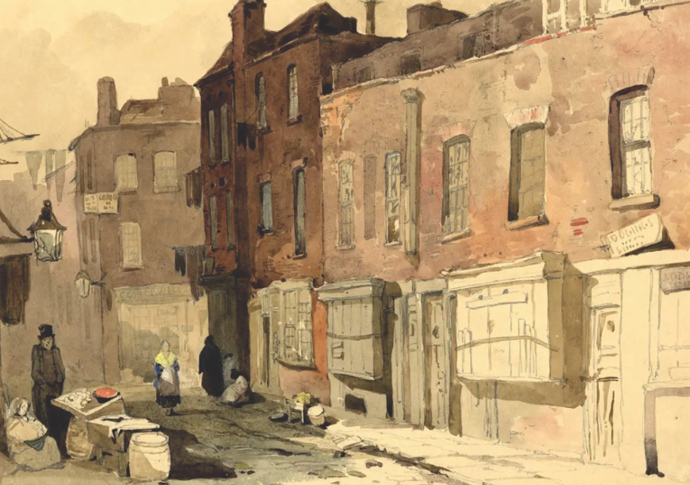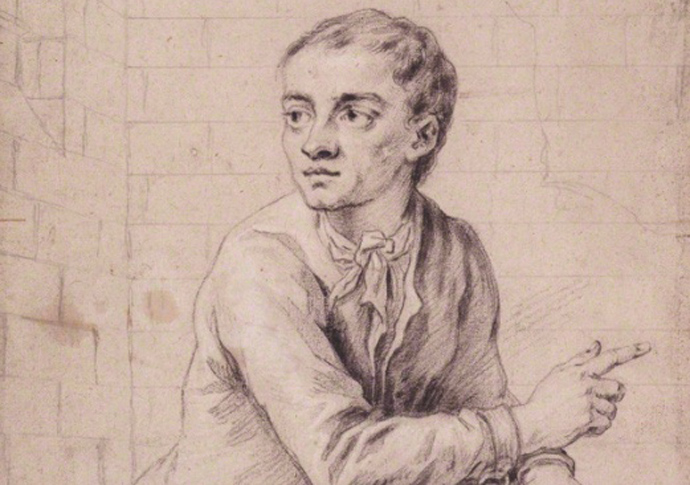Harrington: Ballad of Jack and St Giles
Housebreaker who targeted the rich and famous became the subject of songs, stories and plays
Friday, 25th October 2024

Vivien Ellis has researched the folk songs and ballads telling stories of the St Giles area [Part of the Rookery St Giles_March 1844_ Watercolour over graphite sketch by John Wykeham Archer_c_The Trustees of the British Museum]
JACK Sheppard was a London hero, despite his lawless career.
The housebreaker targeted the rich and famous, which helped his public persona, along with the fact he managed to escape not once but four times from incarceration.
It is no surprise then to hear that Sheppard, hanged in 1724, was the subject of numerous songs, stories, plays and other forms of lamentation when the law finally caught up with him.
Now, 300 years after his death, Jack’s story is one of a number that are being brought to life by choral leader Vivien Ellis.
Ms Ellis is a professional singer and music academic and her research focuses on sourcing ballads and folk songs between the 15th and 18th centuries.
She has won a grant from the Heritage Lottery fund to run a year-long music project on the ballads written about the St Giles area.
Run in conjunction with the Bloomsbury Festival, a performance today (Friday) at St Giles-in-the-Fields church from 6.30pm onwards includes both songs relating to the area and readings from the likes of Charles Dickens and Samuel Pepys.
“People found out what was going on through ballads,” she told me.
“From scandals to sports news, to politics and controversies, everything was contained in a ballad. Music was published on millions of sheets of paper by printers based in Seven Dials.”
One song Ms Ellis has found tells the story of the unfortunate Moll Hackabout, who found herself in Bridewell Prison, Farringdon.

Jack Sheppard, who was hanged as a thief in 1724
“It includes a work song sung by people beating hemp,” she said.
Hemp was used for all manner of things, sails, canvas, rope and working it was a common punishment. The song tells the story of Moll and how she fell into debt, and was then imprisoned.
A ballad about her would have highlighted her plight and the injustice of her situation.
“The ballads were produced for ordinary people who did not read music,” she added. “There were no copyright rules and tunes were drawn from melodies that were well known and shared. They were older than the lyrics and everyone knew them, from royalty to the man in the street.”
Hawkers sold the ballads on the street, in taverns and at work places. They would sing the lyrics out to gain customers and give the purchaser an idea of what they were buying.
One song Ms Ellis has found is known as a Broadside Ballad, a form of popular lyricism.
She found a copy in the Bodleian Library in Oxford among 30,000 others, and it’s called The Bowl of St Giles. It refers to the fact that condemned prisoners, on route to Tyburn, would stop at what is now the Angel Tavern in St Giles to enjoy their last drink.
“I found the ballad written for the famous Jack Sheppard. He was hanged aged just 22 and was famous for escaping from impossible prisons.”
Jack had been a carpenter’s apprentice and was an expert in picking locks, forging keys and getting through prison bars.
The song has the lines: For nothing the transit to Tyburn beguiles
So well as a draught from the Bowl of Saint Giles!
The composer is unknown, and the sheet with the song contained a number of others relating to Jack’s execution.
Ballads were seen as disposable but, thankfully, diarist Samuel Pepys saw the historic value and saved many examples.
“They were ephemeral,” said Ms Ellis.
“People would read them, sing them and then use them to light fires.”
And now, thanks to her diligent work, the St Giles ballad is back.
• Sing Ballads of Bloomsbury, October 25, 6.30pm-8.30pm. St-Giles-in-the-Fields church. Free – just turn up